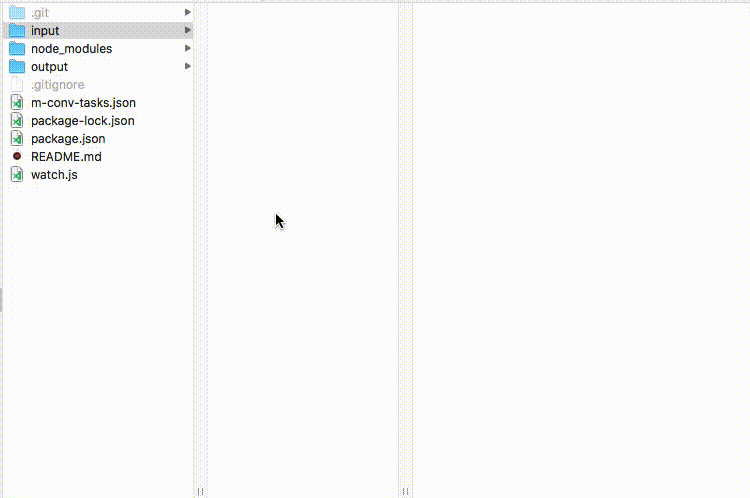m-conv watches a directory and converts media files according to rules defined in a m-conv-tasks.json file. It's supposed to be used on a server where the users can copy their media files onto a network share and then receive their converted files in the output folder.
It allows the user to paste a whole directory tree and will keep that structure in the output directory to be as user-friendly as possible.
The example tasks converts videos to 720p using ffmpeg.
{
"tasks": [
{
"group": "videos",
"command": "ffmpeg -i \"{{input}}\" -y {{flags}} \"{{output}}\"",
"matched_ext": [
"mp4",
"mpg",
"mpeg",
"wmv",
"flv",
"avi",
"mov"
],
"jobs": [
{
"name": "720p_H264_medium",
"flags": "-vf scale=1280:-2 -c:v libx264 -crf 20",
"out_ext": "mp4"
},
{
"name": "720p_H264_high",
"flags": "-vf scale=1280:-2 -c:v libx264 -crf 15",
"out_ext": "mp4"
}
]
}
]
}Name of the group, must be unique among tasks.
Template string for the command that will be executed. You can use the following variables:
{{input}}: Absolute path to the input file, e.g./var/media/file 1.jpg{{output}}: Absolute path to the output file, e.g./var/media/out/file 1.jpg{{flags}}: Flags that are defined in each job
Careful: Make sure to always escape input and output variables with quotation marks as demonstrated in the example task.
Array of file extensions that you want to execute this task on. Do not include a dot in front of the extension.
Array of jobs you want to execute for each file. The name of a job is going to be the name of the output directory. out_ext is the extension that will be added to the final output path in the template variable {{output}}.
CONVERT_WATCH_DIR: Directory to watch, should be a relative path like./share/inputCONVERT_OUT_DIR: Directory for the output files, should be a relative path like./share/output
Both variables default to ./input and ./output.
You should setup a cronjob to empty the directories every now and then:
0 0 * * 0 rm -rf /var/mediaconverter/share/{input,output}/*
